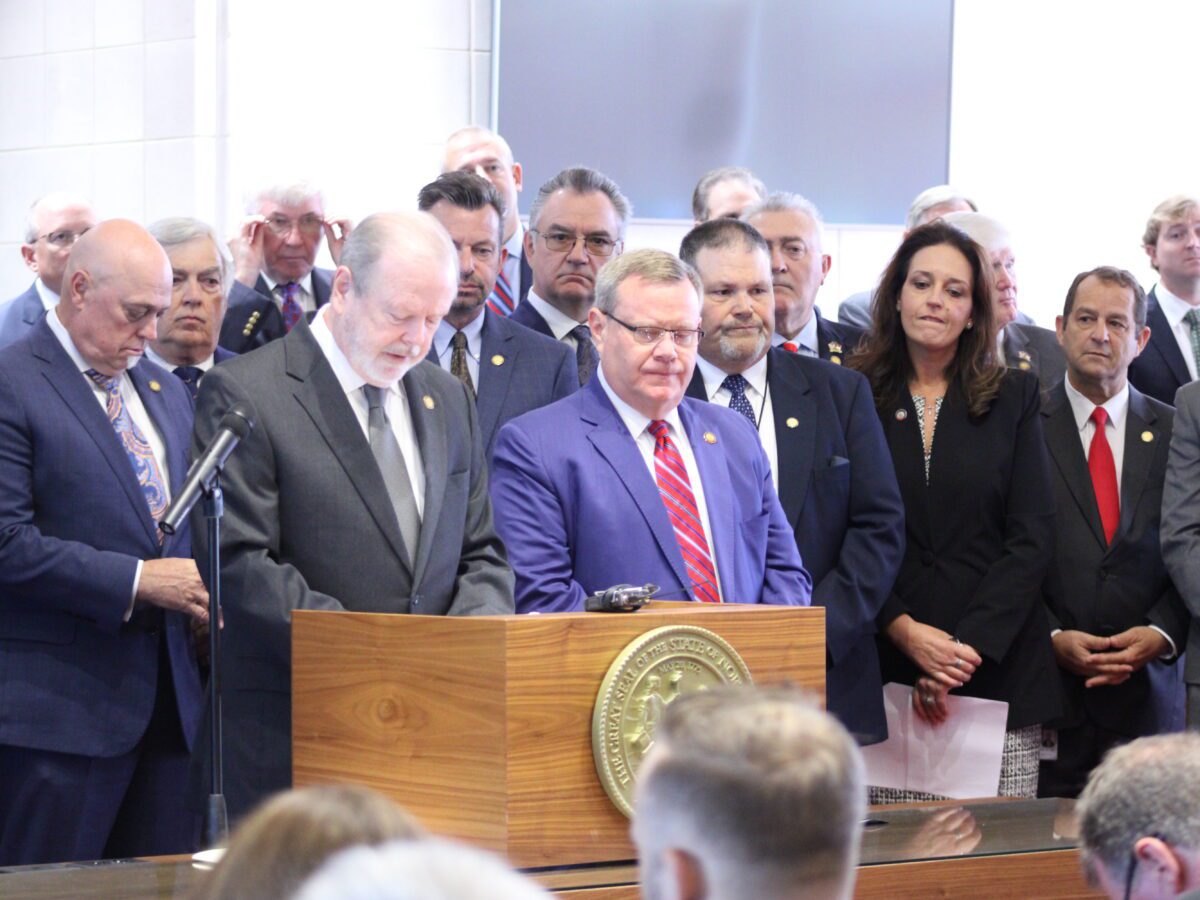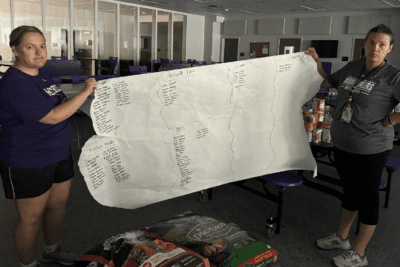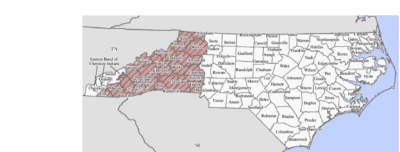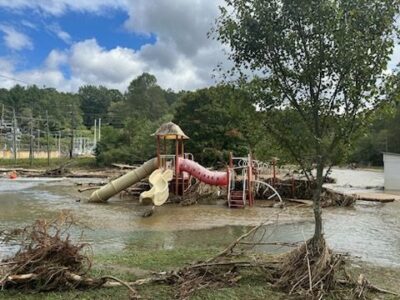
Update, Oct. 10 at 12 p.m. — Gov. Roy Cooper signed the Hurricane Helene relief bill into law on Thursday, Oct. 10.
“Recovery for Western North Carolina will require unprecedented help from state and federal sources and this legislation is a strong first step,” Cooper said in a statement. “Hurricane Helene caused catastrophic damage but also showed the resiliency of North Carolina’s people and its communities and we must continue the bipartisan work to help them build back strong.”
The General Assembly unanimously passed a $273 million Hurricane Helene relief bill with bipartisan support on Wednesday afternoon — the first step of what lawmakers said will be a multiple-year process of recovery for western North Carolina.
Among other things, the bill includes $250 million to the state’s Department of Public Safety and Division of Emergency Management, $16 million to the Department of Public Instruction (DPI) to replace lost compensation of school nutrition employees, and school calendar flexibility and compensation for public school districts and employees impacted by Helene closures.
The bill also extends the governor’s state of emergency for Helene until March 1, 2025.
“Recovering from Hurricane Helene will be no small task, but I believe we, the state and people of North Carolina, are up to that task,” Senate President Pro Tempore Phil Berger, R-Rockingham, said during a press conference introducing the bill. “Today, we’re convening for the first Hurricane Helene disaster recovery package — this is just a first step for us to take as legislators.”
The bill will now go to Democratic Gov. Roy Cooper, who is expected to sign it. The General Assembly will meet next on Oct. 24, lawmakers said Wednesday.
![]() Sign up for the EdDaily to start each weekday with the top education news.
Sign up for the EdDaily to start each weekday with the top education news.
Last week, DPI presented its relief request to the General Assembly, requesting ongoing pay for impacted school employees, school calendar and remote instruction flexibility, and $150 million to address building, equipment, and technology loss.
DPI also requested that students enrolled in educator preparation programs (EPP) in impacted counties to “be deemed having completed the clinical internship requirement if graduating in December 2024 despite not meeting the full 16-week requirement,” and to extend bonuses for qualifying principals in impacted counties, to be paid no later than Nov. 30.
All of the requests — excluding the $150 million for building and technology loss — were included in the relief bill.
“I know the NCGA will appropriate additional funding in terms of building and equipment damage in due time,” state Superintendent Catherine Truitt said in a statement on Wednesday. “This is a great first step to helping out schools, staff and students recover.”
For early childhood education, the bill allows the Department of Health and Human Services (DHHS) to “temporarily waive or modify certain mandatory standards for a license for child care facilities in an area impacted by Hurricane Helene.”
During the press conference, Republican leaders said the bill was crafted in collaboration with state agencies and the governor. The bill-writing process was also informed by previous hurricane-relief legislation, Berger said.
In addition to discussing the specifics of the bill, Republican lawmakers also praised the hard work and generosity of emergency responders, local and state relief organizations, and everyday North Carolinians in recovery efforts.
“With all the tragedy we’ve seen in western North Carolina, we’ve also seen an incredible amount of humanity,” said House Speaker Rep. Tim Moore, R-Cleveland. “This is going to be months and months and months. …The folks of western North Carolina need to know they are not going to be forgotten.”
On Wednesday afternoon, House Democrats held a press conference to discuss the damage to western North Carolina and the impact of climate change on hurricanes.
“I’m deeply grateful for the work this body and my colleagues across the aisle have done today to provide relief, for the efforts to support our first responders, small business owners, teachers, to help those struggling, to make it easier for folks to vote during this disaster,” said Rep. Caleb Rudow, D-Buncombe. “But we can’t stop here. I hope this is the beginning of a larger conversation about resilience, about building back better, and about confronting climate change head-on.”
You can view the full relief bill here.
The General Assembly has also created a relief request form, which you can access here.
Read more about Helene



Voting in impacted counties and other highlights from the bill
On Wednesday, Republicans said the state wanted to use federal disaster relief funds first before allocating state resources.
The $250 million for state emergency management includes required match dollars for state and local governments to receive federal disaster funds.
In addition to the funding allocated for emergency management and to DPI, the relief bill also includes:
- $2 million for the Office of State Budget and Management to “provide grants to the North Carolina League of Municipalities, the North Carolina Association of County Commissioners, and the North Carolina Association of Regional Councils of Governments to provide technical assistance with local recovery funds. In providing this assistance, these entities shall prioritize grants to counties with a population of less than 250,000.”
- $5 million to the State Board of Elections to assist with voter outreach and education in counties impacted by Hurricane Helene.
On Monday, the North Carolina State Board of Elections voted to give the following 13 counties impacted by Helene broad authority to change their election plans: Ashe, Avery, Buncombe, Haywood, Henderson, Madison, McDowell, Mitchell, Polk, Rutherford, Transylvania, Watauga, and Yancey counties.
The resolution, which was unanimously approved by the bipartisan board, allows the 13 counties to change their early voting and Election Day polling sites, and also gives local boards greater flexibility in appointing poll workers and expands options to receive and deliver absentee ballots for voters in the affected counties.
“These counties report that not all of their scheduled early voting sites or election day voting sites will be available due to damage from the storm, inaccessibility, the site’s current use for disaster response, or the likely unavailability of sufficient staff,” the emergency resolution says.
The relief bill expands those measures to all 25 counties originally included in the federal disaster declaration: Alexander, Alleghany, Ashe, Avery, Buncombe, Burke, Caldwell, Catawba, Clay, Cleveland, Gaston, Haywood, Henderson, Jackson, Lincoln, Macon, Madison, McDowell, Mitchell, Polk, Rutherford, Transylvania, Watauga, Wilkes, and Yancey.
The majority of the bill’s election modification codifies what the state Board passed on Monday, Berger said, and was written in consultation with the Board.
The $5 million allocated in the bill to the State Board of Elections will go toward the following initiatives in the 25 counties during the 2024 general election:
- Technology and access to technology, such as attack response kits, SOSA deployments, and internet connectivity.
- Printing and communications, such as re-printing absentee ballots, mailing materials to registered voters, and purchasing emergency communication systems for counties as needed.
- Temporary staff for counties and the State Board of Elections.
- Mobile voting units, training, equipment, leases, and supplies to enable voting, including changes in voting sites.
The relief bill also directs the Board to report on efforts to implement the funding to the General Assembly by April 15, 2025.
“The report shall include an evaluation of emergency measures necessary to ensure the seamless conduct of secure elections in the aftermath of a natural disaster and recommendations for emergency response plans in the future,” the bill says.
On Wednesday, House Democrats made a motion to extend voter registration and absentee voter deadlines in counties hit by Helene. The motion failed, with Republicans saying the relief bill already included necessary election changes to make voting easier for those impacted by the storm.
You can read all of the election modifications included in the bill starting on page 7 of the document.
The bill also “temporarily removes barriers to allow retirees of the teachers’ and state employees’ retirement system and the local governmental retirement system to return to work on a part-time, temporary, or interim basis” if they are returning to assist with Helene recovery efforts.
The legislation allows the governor to waive Division of Motor Vehicle (DMV) fees to replace drivers license, issue special identification cards, replace titles or registration palates, or for late payment of a motor vehicle registration renewal fee. It also provides for emergency business loans to be dispersed through Golden LEAF, with a priority on “historically underutilized small businesses.” Those fees can be waived in impacted counties through Dec. 31, 2024.
The bill also includes several measures concerning drinking water, wastewater treatment, and open-burning of storm-related debris in the impacted counties.
“The General Assembly is fully activated in its efforts to provide relief to Western North Carolina,” Berger said in a press release on Wednesday. “This package is just the first round, and more funding will be on the way as we categorize and evaluate the extent of the damage. In the coming months, we will do everything we can to rebuild the region and provide relief to those who so desperately need it.”
Finally, the bill documents the following events after Hurricane Helene:
- Western North Carolina endured record-breaking rainfall that created several 1,000-year flood events in several counties, devastating the people, infrastructure, businesses, and schools of entire communities.
- On September 28, 2024, 25 counties in North Carolina were declared a major disaster by the President of the United States under the Stafford Act (P.L. 24 93-288), approving individual and public assistance for affected counties.
- North Carolinians have lost their lives, loved ones, homes, communities, houses of worship, businesses, jobs, and way of life.
- Countless homes, buildings, and properties have been destroyed.
- Entire communities have lost power, water, sewer, communication, and other essential services due to the devastation.
- Over 400 roads and bridges were damaged and closed for traffic, including Interstate 40.
- Landslides and flooding have cut off entire communities from outside help and communication.
- Tornadoes were generated across the State as Hurricane Helene passed, causing significant damage in areas outside of the storm’s immediate path.
During the press conference, Republican Sen. Ralph Hise said all the counties he represents — Alleghany, Ashe, Avery, Caldwell, Haywood, Madison, Mitchell, Watauga, and Yancey — have been impacted by the hurricane.
He noted that the relief bill marks only the first step of the General Assembly’s response to Helene’s destruction in the west.
“This is by far the most devastating thing I’ve ever experienced as a community,” Hise said. “We’ve had an incredible outpouring from so many communities across the state and others, but we’re in a long-term recovery. … I hope we can begin to show that North Carolina is stepping up to its responsibilities, and we are here for the people of the West.”
Recommended reading



